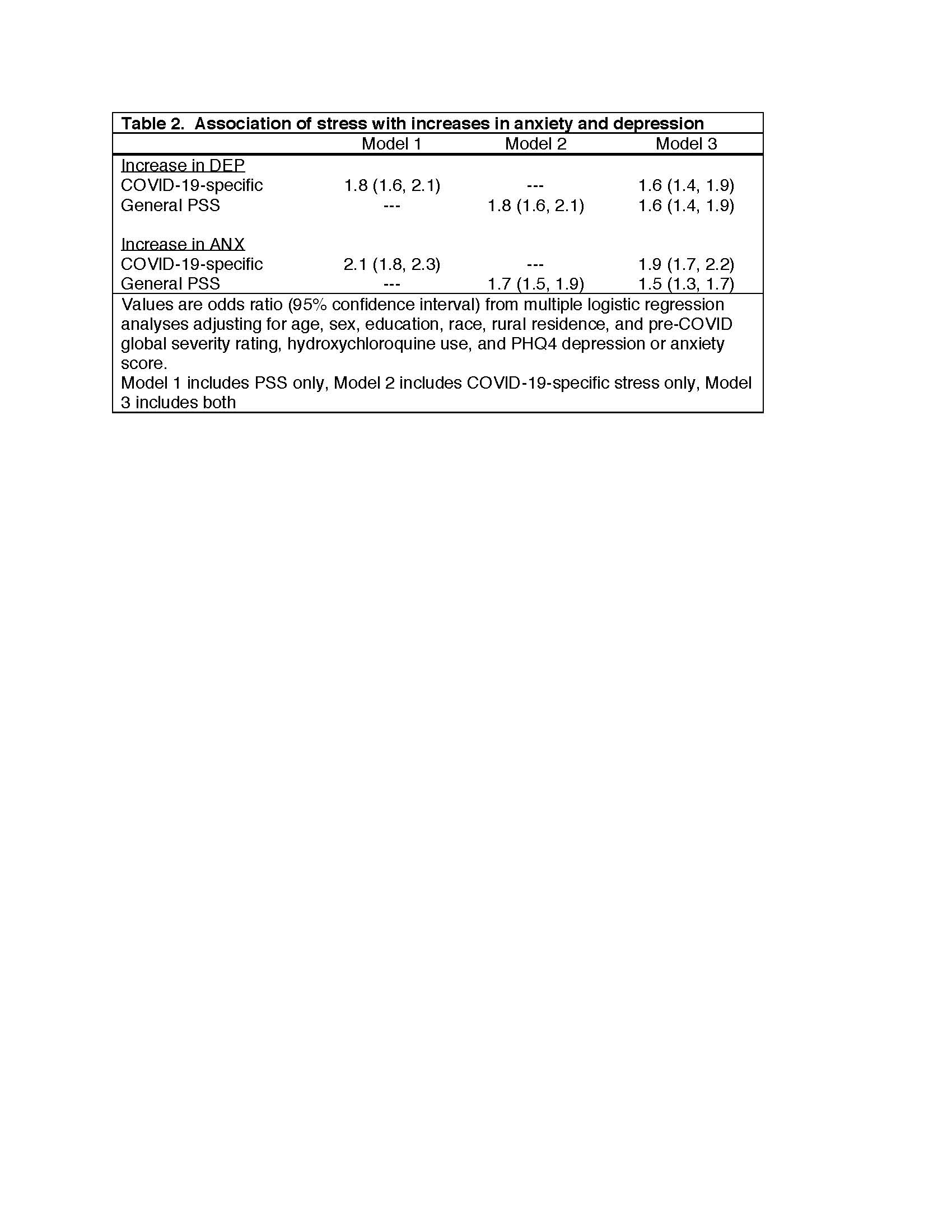Session Information
Date: Friday, November 6, 2020
Session Type: Abstract Session
Session Time: 4:00PM-4:50PM
Background/Purpose: Symptoms of both depression and anxiety are often elevated among individuals with rheumatic conditions, and stress levels may play a role in each. Depression, anxiety, and stress have also been linked to worse outcomes. We examined changes in symptoms of anxiety and depression from pre-pandemic to during the pandemic, with a focus on the role of stress.
Methods: Data are from FORWARD, The National Databank for Rheumatic Diseasesa longitudinal registry of individuals with rheumatic diseases. Data are regularly collected via semi-annual questionnaires. Participants with active emails were asked to respond to 5 COVID-19-specific questionnaires from March 25 through June 2, 2020. Both regular and COVID-19 questionnaires included the PHQ4, a validated screening measure for symptoms of anxiety (ANX) and depression (DEP). The COVID-19 questionnaire also include an item about COVID-19-specific stress (“how much stress or worry has the COVID-19 pandemic caused you? None, a little, moderate amount, great deal) and the 4-item Perceived Stress Scale (PSS), which assesses general stress. Both stress scale scores were transformed to 0 – 10 scores to facilitate comparison. Participant characteristics were taken from the most recent semi-annual (pre-COVID-19) questionnaire. Analyses examined the frequency of increases in ANX and DEP, defined as score change ≥2. Predictors of ANX and DEP increases among respondents with rheumatoid arthritis (RA), osteoarthritis (OA), and lupus (SLE) were identified using multiple logistic regression, focusing on the role of COVID-19-specific stress and PSS, and controlling for age, sex, race, education, rural residence, disease duration, and pre-COVID-19 global disease severity rating, and DEP and ANX scores.
Results: A total of 7217 participants were invited; 2000 (28%) responded at ≥1 COVID-19 questionnaire. Only those reporting diagnoses of RA, OA, or SLE (n=1504) are included in analyses. Respondent characteristics are shown in Table 1. COVID-specific stress ratings were twice as high as general stress ratings. Correlation between the two was 0.40. Increases in ANX were more common than increases in DEP (ANX: 10.6%; DEP: 7.9%), with no significant differences in frequency of increases among condition groups. Both COVID-19-specific and general stress were significantly associated with increases in DEP and ANX (Table 2).
Conclusion: Substantial increases in symptoms of both anxiety and depression were found when comparing scores from pre-pandemic to during the pandemic. Both COVID-19-specific and general stress levels were significantly associated with those changes. While the impact on disease outcomes remains to be seen, results suggest the need for assessment of stress in clinical settings and identification of effective stress management techniques.
To cite this abstract in AMA style:
Katz P, Pedro S, Wipfler K, Simon T, Shaw Y, Cornish A, Michaud K. Changes in Mental Health During the COVID-19 Pandemic Among Individuals with Rheumatic Disease [abstract]. Arthritis Rheumatol. 2020; 72 (suppl 10). https://acrabstracts.org/abstract/changes-in-mental-health-during-the-covid-19-pandemic-among-individuals-with-rheumatic-disease/. Accessed .« Back to ACR Convergence 2020
ACR Meeting Abstracts - https://acrabstracts.org/abstract/changes-in-mental-health-during-the-covid-19-pandemic-among-individuals-with-rheumatic-disease/


